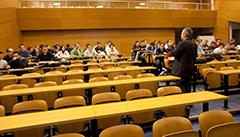
Sciences & Société
Soutenance de thèse : Ibtissam TOUIL
Multi-micro/nanolayers of highly mismatched viscoelastic polymers based on polyethylene with varying macromolecular architectures: Multiscale investigations towards better control of their structuration and recycling by coextrusion
Doctorante : Ibtissam TOUIL
Laboratoire INSA : IMP
Ecole doctorale : ED34 Matériaux de Lyon
This study aims to understand the effects of confinement on the rheology and molecular dynamics in multilayer polymeric structures fabricated by the forced-assembly multilayer coextrusion of polyethylenes (PE) and confined polymers (PS and PC). The originality of our approach deals with coextrusion of these high mismatched viscoelastic systems. Through this work, PEs with varying macromolecular architectures, with short-chain branching (SCB) and long-chain branching (LCB), were used. Various nano-structured multilayer structures with stable flow and layered architecture were then obtained. Hitherto, various characterization techniques such as WAXS, SEM or TEM, and rheology were used to probe the structure and molecular dynamics of the PE chains. Micro and nanolayered instabilities were observed depending on the viscoelastic mismatched properties and interfacial tensions. The layer multiplication strongly affects the crystallization microstructure/morphology and molecular orientations of PEs. Interestingly, we found that macromolecular and geometrical confinements further influence the final morphology. Subsequently, they remarkably influence the rheology and molecular dynamics of PEs depending on the amount of LCB. From micro- to nanolayers, strain hardening properties in the extensional measurements are strongly dependent on the number of layers, architecture, compositions and confinement. Relevant mechanisms involving molecular rheology theories are proposed to elucidate the reasons underlying the changes. Meanwhile, we were able to model interfacial tension properties especially in the case of nanolayered polymeric systems. Hence, this work clearly demonstrates how the multiscale structural evolution during the micro-/nano-layer coextrusion process can control the final properties of multilayered products. Our findings are aimed at a better understanding of the interfacial properties towards controlling the interface/interphases in the present micro-nanostructured model multilayers polymers including their recyclability for advanced applications ranging from ultra-barrier films from cast extrusion to flexible and high transparency sheets for thermoforming process. Finally, and in the context of circular economy, a future-oriented approach from eco-design to a recycling strategy of the studied multi-micro/nanolayered systems was investigated. Therefore, a novel route is purposed to decrease the number of constituents, control the thickness of the layers, avoid using tie layers, and enhance the recyclability of the studied systems.
Informations complémentaires
-
Amphithéâtre Eugène Freyssinet (Bât. Eugène Freyssinet) - Villeurbanne

